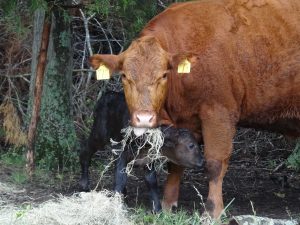In humans, a negative emotional state has been linked to interpreting ambiguous cues more negatively in judgement tests than humans in a positive emotional state and these tests have been applied to animals in order to evaluate a cognitive response.
Interestingly, research has shown that calves exhibit pessimistic judgement bias in judgement tasks after abrupt maternal separation which is evidence that they experience a low mood and a negative affective state. This negative judgement bias is also consistent with calves that experience pain after hot iron dehorning. In this research, 13 Holstein calves were trained to discriminate between white and red screens which were associated with either reward or punishment. After separation from the dam, calves were less likely to approach ambiguous screens, indicating a pessimistic response bias which lasted at least for 2.5 days after separation. Other negative behavioral and physiological changes may have occurred for a longer time. Calves were allowed to suckle milk from an artificial teat after separation so this bias can be associated with loss of social bond with the mother as opposed to loss of nutrition or suckling behavior. This negative affective state due to loss of a maternal bond suggests welfare issues attributed to the abrupt severing of this bond and the importance of incorporating housing systems that allow some contact with the mom.

